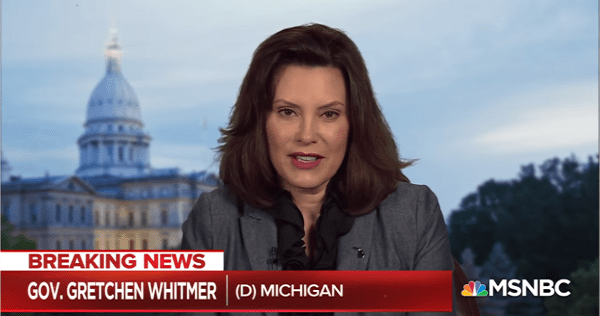
Michigan Gov. Gretchen Whitmer is one of many politicians under fire for what many believe are extreme measures to fight the coronavirus. (Screen snip, YouTube, MSNBC)
With closures of so-called “non-essential” businesses to include gun stores in several jurisdictions, combined with shutdowns of public parks, national park facilities and even fishing and spring turkey and bear hunting in Washington State, the announcement by a police department in Connecticut that it will monitor “social distancing” with drones raises the question: Was liberty the real first casualty of the coronavirus?
Writing at the National Review, senior writer David Harsanyi contends, as the headline explains, “Coronavirus authoritarianism is getting out of hand.” The story is illustrated with an image of a jubilant Gretchen Whitmer, on her election as Michigan governor. Now, 16 months after taking office, a growing number of Michigan residents are furious for what they consider her extreme measures that include, according to NBC News, not being “allowed to travel to in-state vacation residences. They are not permitted to use a motor boat. Business restrictions have been tightened, including that large stores must close areas “dedicated to carpeting, flooring, furniture, garden centers, plant nurseries, or paint,” among other measures. Violators could be fined or charged with a misdemeanor, though the practicality of strict enforcement was unclear.”
In Washington State, Gov. Jay Inslee’s measures include a shutdown of sport fishing. The Department of Fish & Wildlife put the spring black bear and general turkey seasons on hold and delayed the lowland lakes fishing opener. Shellfish seasons are also “delayed” (once a low tide period has passed, it’s gone).
At the national forest level, according to a memorandum from Regional Forester Glenn Casamassa in Portland, developed recreation sites, trailheads and other facilities are closed during the COVID-19 emergency on national forest lands in Oregon and Washington.
National Review’s Harsanyi cuts to the chase: “It’s reasonable to assume that the vast majority of Americans process news and data, and calculate that self-quarantining, wearing masks, and social distancing make sense for themselves, their families, and the country. Free people act out of self-preservation, but they shouldn’t be coerced to act through the authoritarian whims of the state. Yet this is exactly what’s happening.”
It should be no wonder, yet ironic, that leading the effort to blunt some of this authoritarian activity are gun rights organizations. Groups including the Second Amendment Foundation, Firearms Policy Coalition, National Rifle Association, New Jersey Second Amendment Society and others have filed a string of lawsuits focusing on orders to close gun stores as “non-essential.”
Since when has the exercise of a constitutionally-protected fundamental right been considered “non-essential,” gun owners wonder.
But these lawsuits, some of which have already caused authorities in some states to re-think their positions, constitute more than just an effort to keep gun store doors open, despite what the gun prohibition lobbying groups have asserted.
The gun groups have drawn a legal line in the sand, reminding public officials they lack the authority to suspend constitutional rights. While the Second Amendment focuses on arms, the First Amendment is also under attack. Freedom of religion, the right to peaceably assemble; there is more to the First Amendment than just freedom of the press.
When California sheriff’s deputies arrest a paddle boarder for violating a “stay-at-home” order, and when police in Meriden, Conn., use a drone to enforce “social distancing,”
Harsanyi contends that American “politicians act as if a health crisis gives them license to lord over the most private activities of America people in ways that are wholly inconsistent with the spirit and letter of the Constitution.”
If he’s right—and to a growing number of citizens it appears he is—then so are the Second Amendment groups for stepping in quickly to bring this authoritarianism to an abrupt halt, and for voters to remember these politicians at election time.